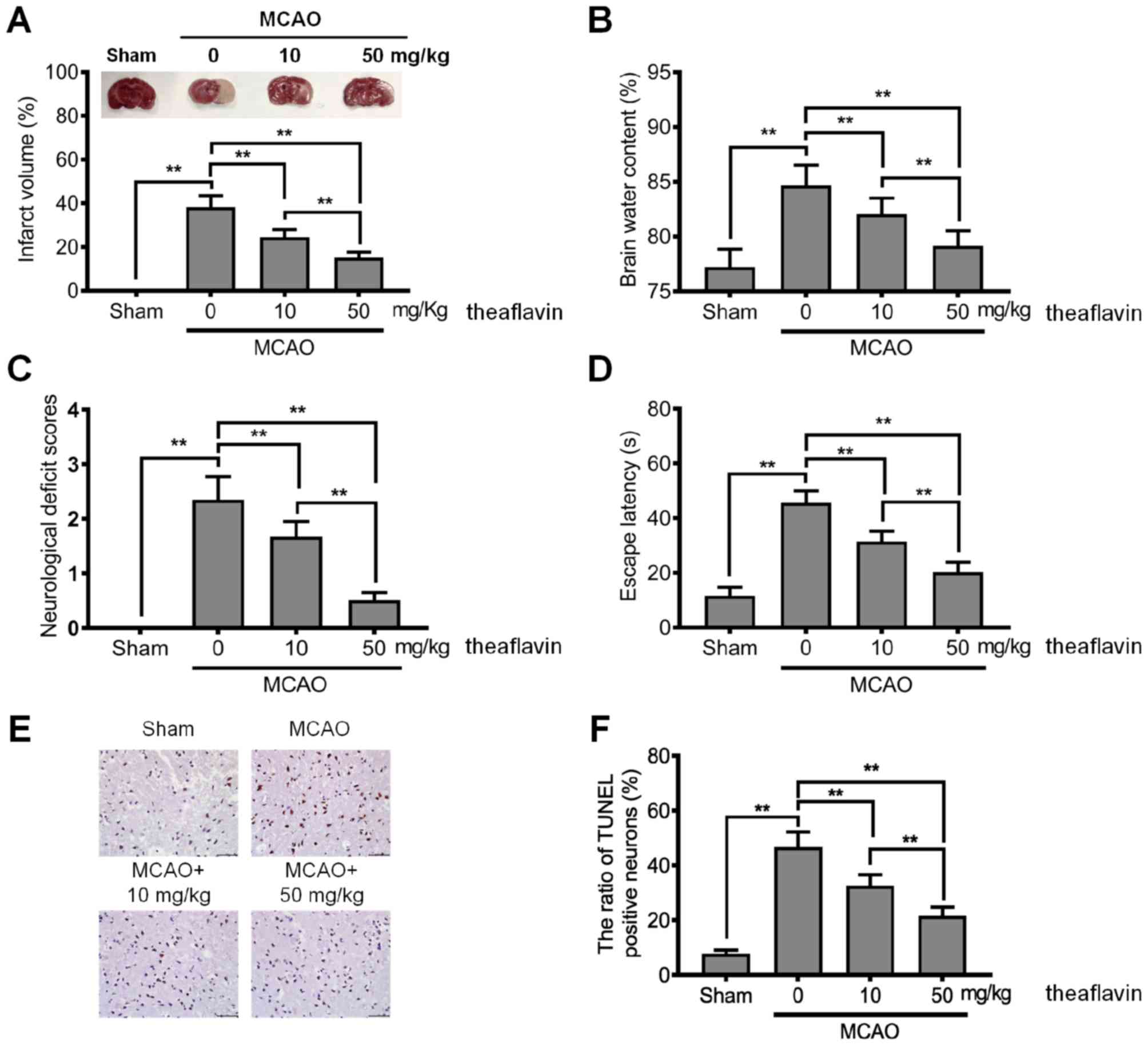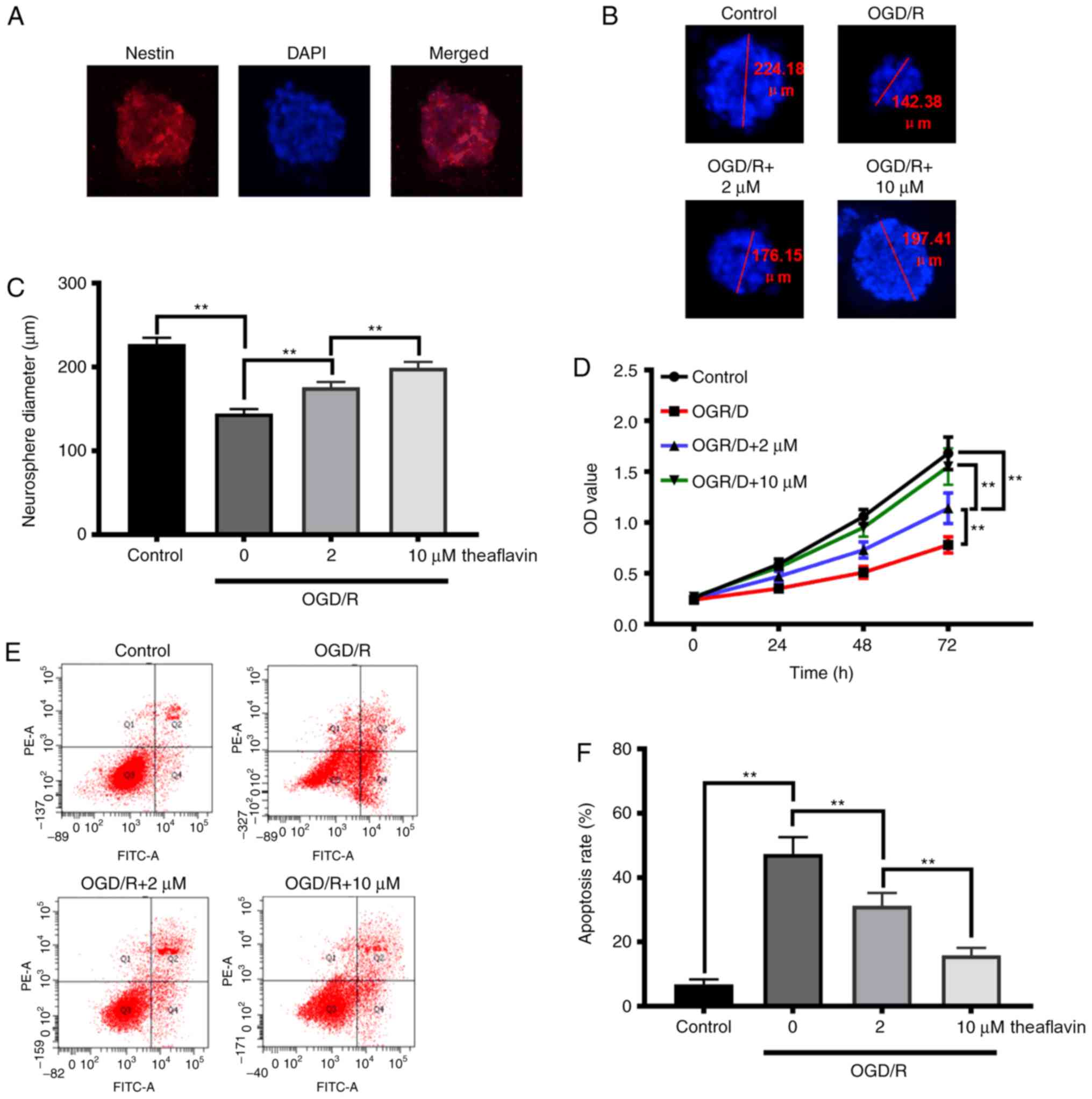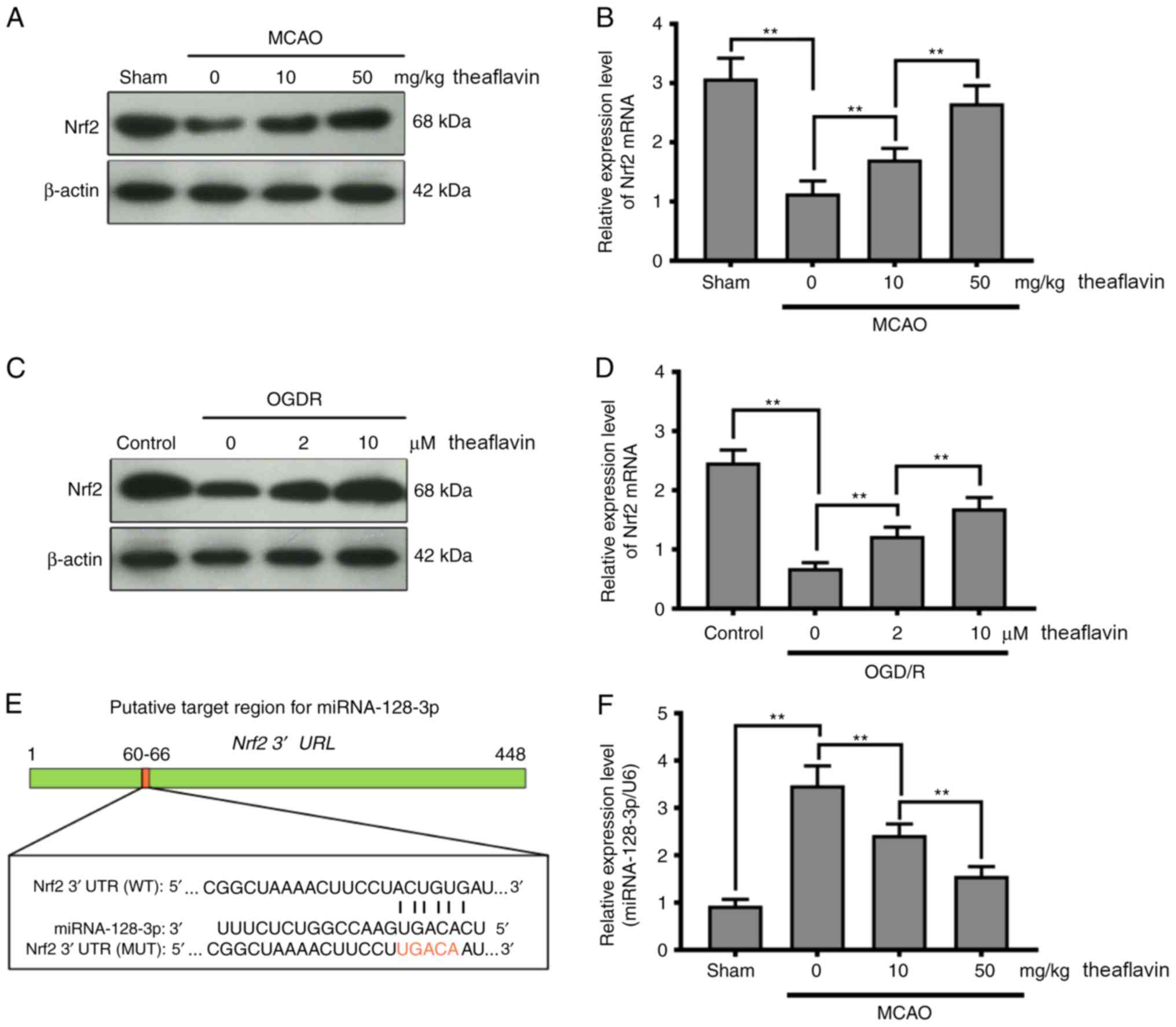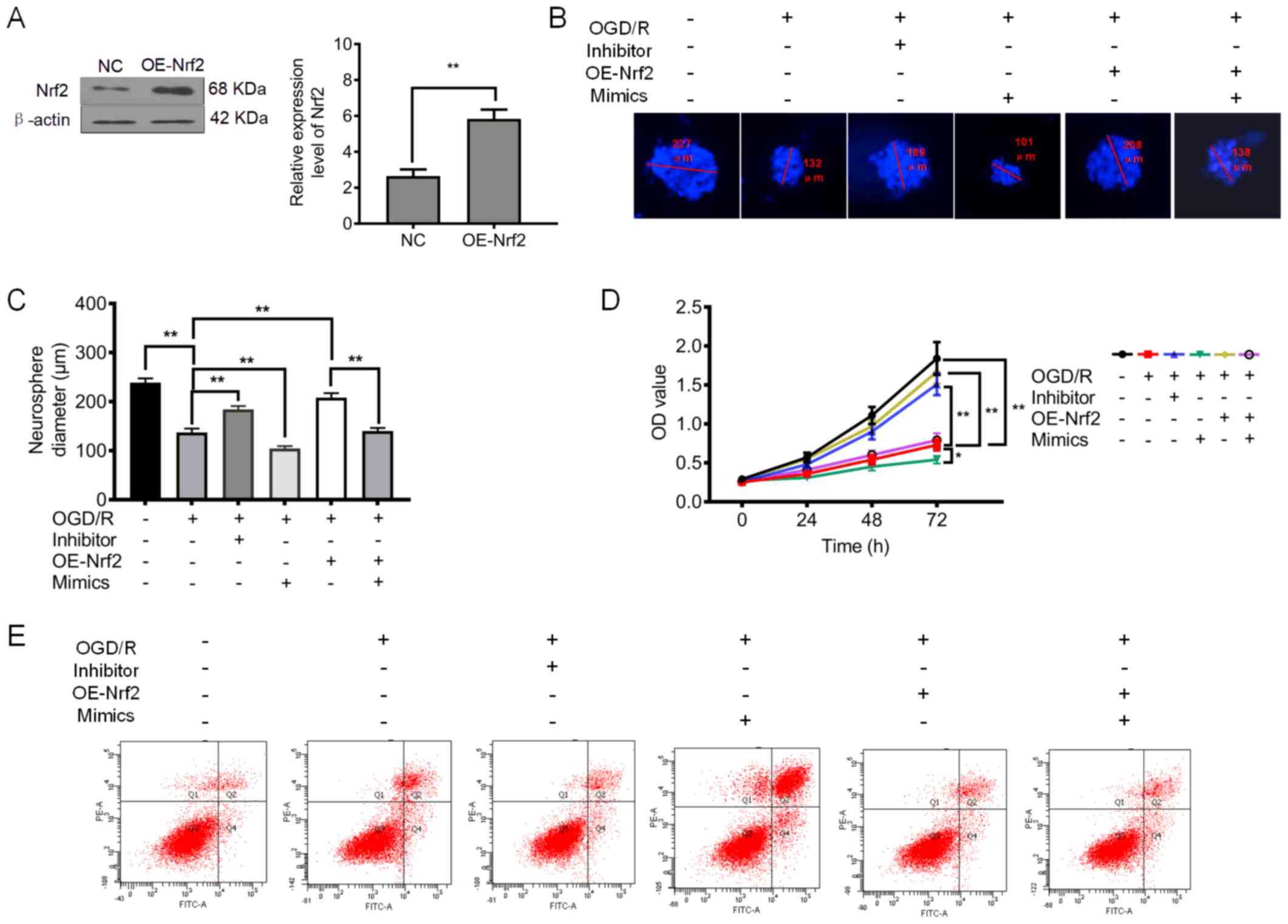|
1
|
Della-Morte D, Pacifici F and Rundek T:
Genetic susceptibility to cerebrovascular disease. Curr Opin
Lipidol. 27:187–195. 2016. View Article : Google Scholar : PubMed/NCBI
|
|
2
|
Hu X, De Silva TM, Chen J and Faraci FM:
Cerebral vascular disease and neurovascular injury in ischemic
stroke. Circ Res. 120:449–471. 2017. View Article : Google Scholar : PubMed/NCBI
|
|
3
|
Gerschenfeld G, Muresan IP, Blanc R,
Obadia M, Abrivard M, Piotin M and Alamowitch S: Two paradigms for
endovascular thrombectomy after intravenous thrombolysis for acute
ischemic stroke. JAMA Neurol. 74:549–556. 2017. View Article : Google Scholar : PubMed/NCBI
|
|
4
|
Ji K, Xue L, Cheng J and Bai Y:
Preconditioning of H2S inhalation protects against cerebral
ischemia/reperfusion injury by induction of HSP70 through
PI3K/Akt/Nrf2 pathway. Brain Res Bull. 121:68–74. 2016. View Article : Google Scholar : PubMed/NCBI
|
|
5
|
Xu J, Kong X, Xiu H, Dou Y, Wu Z and Sun
P: Combination of curcumin and vagus nerve stimulation attenuates
cerebral ischemia/reperfusion injury-induced behavioral deficits.
Biomed Pharmacother. 103:614–620. 2018. View Article : Google Scholar : PubMed/NCBI
|
|
6
|
Chen X, Wu H, Chen H, Wang Q, Xie XJ and
Shen J: Astragaloside VI promotes neural stem cell proliferation
and enhances neurological function recovery in transient cerebral
ischemic injury via activating EGFR/MAPK signaling cascades. Mol
Neurobiol. 56:3053–3067. 2019. View Article : Google Scholar : PubMed/NCBI
|
|
7
|
Wu J, Chen Y, Yu S, Li L, Zhao X, Li Q,
Zhao J and Zhao Y: Neuroprotective effects of sulfiredoxin-1 during
cerebral ischemia/reperfusion oxidative stress injury in rats.
Brain Res Bull. 132:99–108. 2017. View Article : Google Scholar : PubMed/NCBI
|
|
8
|
Wang M, Li YJ, Ding Y, Zhang HN, Sun T,
Zhang K, Yang L, Guo YY, Liu SB, Zhao MG and Wu YM: Silibinin
prevents autophagic cell death upon oxidative stress in cortical
neurons and cerebral ischemia-reperfusion injury. Mol Neurobiol.
53:932–943. 2016. View Article : Google Scholar : PubMed/NCBI
|
|
9
|
Guo C, Wang S, Duan J, Jia N, Zhu Y, Ding
Y, Guan Y, Wei G, Yin Y, Xi M and Wen A: Protocatechualdehyde
protects against cerebral ischemia-reperfusion-induced oxidative
injury via protein kinase Cε/Nrf2/HO-1 pathway. Mol Neurobiol.
54:833–845. 2017. View Article : Google Scholar : PubMed/NCBI
|
|
10
|
Khajevand-Khazaei MR, Azimi S, Sedighnejad
L, Salari S, Ghorbanpour A, Baluchnejadmojarad T, Mohseni-Moghaddam
P, Khamse S and Roghani M: S-allyl cysteine protects against
lipopolysaccharide-induced acute kidney injury in the C57BL/6 mouse
strain: Involvement of oxidative stress and inflammation. Int
Immunopharmacol. 69:19–26. 2019. View Article : Google Scholar : PubMed/NCBI
|
|
11
|
Chen M, Dai LH, Fei A, Pan SM and Wang HR:
Isoquercetin activates the ERK1/2-Nrf2 pathway and protects against
cerebral ischemia-reperfusion injury in vivo and in
vitro. Exp Ther Med. 13:1353–1359. 2017. View Article : Google Scholar : PubMed/NCBI
|
|
12
|
Zhang W, Wei R, Zhang L, Tan Y and Qian C:
Sirtuin 6 protects the brain from cerebral ischemia/reperfusion
injury through NRF2 activation. Neuroscience. 366:95–104. 2017.
View Article : Google Scholar : PubMed/NCBI
|
|
13
|
Chang C, Zhao Y, Song G and She K:
Resveratrol protects hippocampal neurons against cerebral
ischemia-reperfusion injury via modulating JAK/ERK/STAT signaling
pathway in rats. J Neuroimmunol. 315:9–14. 2018. View Article : Google Scholar : PubMed/NCBI
|
|
14
|
Jiao S, Zhu H, He P and Teng J: Betulinic
acid protects against cerebral ischemia/reperfusion injury by
activating the PI3K/Akt signaling pathway. Biomed Pharmacother.
84:1533–1537. 2016. View Article : Google Scholar : PubMed/NCBI
|
|
15
|
Feng Q, Torii Y, Uchida K, Nakamura Y,
Hara Y and Osawa T: Black tea polyphenols, theaflavins, prevent
cellular DNA damage by inhibiting oxidative stress and suppressing
cytochrome P450 1A1 in cell cultures. J Agric Food Chem.
50:213–220. 2002. View Article : Google Scholar : PubMed/NCBI
|
|
16
|
Zhang J, Cai S, Li J, Xiong L, Tian L, Liu
J, Huang J and Liu Z: Neuroprotective effects of theaflavins
against oxidative stress-induced apoptosis in PC12 cells. Neurochem
Res. 41:3364–3372. 2016. View Article : Google Scholar : PubMed/NCBI
|
|
17
|
Cai F, Li CR, Wu JL, Chen JG, Liu C, Min
Q, Yu W, Ouyang CH and Chen JH: Theaflavin ameliorates cerebral
ischemia-reperfusion injury in rats through its anti-inflammatory
effect and modulation of STAT-1. Mediators Inflamm. 2006:304902006.
View Article : Google Scholar : PubMed/NCBI
|
|
18
|
Liang Q, Luo Z, Zeng J, Chen W, Foo SS,
Lee SA, Ge J, Wang S, Goldman SA, Zlokovic BV, et al: Zika virus
NS4A and NS4B proteins deregulate Akt-mTOR signaling in human fetal
neural stem cells to inhibit neurogenesis and induce autophagy.
Cell Stem Cell. 19:663–671. 2016. View Article : Google Scholar : PubMed/NCBI
|
|
19
|
Li M, Liao YJ, Hou GH, Yang ZB and Zuo ML:
Monosialotetrahexosylganglioside protect cerebral
ischemia/reperfusion injury through upregulating the expression of
tyrosine hydroxylase by inhibiting lipid peroxidation. Biomed
Pharmacother. 84:1923–1929. 2016. View Article : Google Scholar : PubMed/NCBI
|
|
20
|
Hodge RD, Nelson BR, Kahoud RJ, Yang R,
Mussar KE, Reiner SL and Hevner RF: Tbr2 is essential for
hippocampal lineage progression from neural stem cells to
intermediate progenitors and neurons. J Neurosci. 32:6275–6287.
2012. View Article : Google Scholar : PubMed/NCBI
|
|
21
|
Chen T, Yu Y, Tang LJ, Kong L, Zhang CH,
Chu HY, Yin LW and Ma HY: Neural stem cells over-expressing
brain-derived neurotrophic factor promote neuronal survival and
cytoskeletal protein expression in traumatic brain injury sites.
Neural Regen Res. 12:433–439. 2017. View Article : Google Scholar : PubMed/NCBI
|
|
22
|
Longa EZ, Weinstein PR, Carlson S and
Cummins R: Reversible middle cerebral artery occlusion without
craniectomy in rats. Stroke. 20:84–91. 1989. View Article : Google Scholar : PubMed/NCBI
|
|
23
|
Livak KJ and Schmittgen TD: Analysis of
relative gene expression data using real-time quantitative PCR and
the 2(-Delta Delta C(T)) method. Methods. 25:402–408. 2001.
View Article : Google Scholar : PubMed/NCBI
|
|
24
|
Benakis C, Brea D, Caballero S, Faraco G,
Moore J, Murphy M, Sita G, Racchumi G, Ling L, Pamer EG, et al:
Commensal microbiota affects ischemic stroke outcome by regulating
intestinal γδ T cells. Nat Med. 22:516–523. 2016. View Article : Google Scholar : PubMed/NCBI
|
|
25
|
Choudhury GR and Ding S: Reactive
astrocytes and therapeutic potential in focal ischemic stroke.
Neurobiol Dis. 85:234–244. 2016. View Article : Google Scholar : PubMed/NCBI
|
|
26
|
Imran A, Arshad MU, Arshad MS, Imran M,
Saeed F and Sohaib M: Lipid peroxidation diminishing perspective of
isolated theaflavins and thearubigins from black tea in arginine
induced renal malfunctional rats. Lipids Health Dis. 17:1572018.
View Article : Google Scholar : PubMed/NCBI
|
|
27
|
Tipoe GL, Leung TM, Hung MW and Fung ML:
Green tea polyphenols as an anti-oxidant and anti-inflammatory
agent for cardiovascular protection. Cardiovasc Hematol Disord Drug
Targets. 7:135–144. 2007. View Article : Google Scholar : PubMed/NCBI
|
|
28
|
Fan FY, Sang LX and Jiang M: Catechins and
their therapeutic benefits to inflammatory bowel disease.
Molecules. 22(pii): E4842017. View Article : Google Scholar : PubMed/NCBI
|
|
29
|
Bernatoniene J and Kopustinskiene DM: The
role of catechins in cellular responses to oxidative stress.
Molecules. 23(pii): E9652018. View Article : Google Scholar : PubMed/NCBI
|
|
30
|
Zhang Y, Xu D, Qi H, Yuan Y, Liu H, Yao S,
Yuan S and Zhang J: Enriched environment promotes post-stroke
neurogenesis through NF-κB-mediated secretion of IL-17A from
astrocytes. Brain Res. 1687:20–31. 2018. View Article : Google Scholar : PubMed/NCBI
|
|
31
|
Wang J, Fu X, Zhang D, Yu L, Li N, Lu Z,
Gao Y, Wang M, Liu X, Zhou C, et al: ChAT-positive neurons
participate in subventricular zone neurogenesis after middle
cerebral artery occlusion in mice. Behav Brain Res. 316:145–151.
2017. View Article : Google Scholar : PubMed/NCBI
|
|
32
|
Li P, Shen M, Gao F, Wu J, Zhang J, Teng F
and Zhang C: An antagomir to MicroRNA-106b-5p ameliorates cerebral
ischemia and reperfusion injury in rats via inhibiting apoptosis
and oxidative stress. Mol Neurobiol. 54:2901–2921. 2017. View Article : Google Scholar : PubMed/NCBI
|
|
33
|
Tao X, Sun X, Xu L, Yin L, Han X, Qi Y, Xu
Y, Zhao Y, Wang C and Peng J: Total flavonoids from Rosa
laevigata Michx fruit ameliorates hepatic ischemia/reperfusion
injury through inhibition of oxidative stress and inflammation in
rats. Nutrients. 8(pii): E4182016. View Article : Google Scholar : PubMed/NCBI
|
|
34
|
Li K, Ding D and Zhang M: Neuroprotection
of osthole against cerebral ischemia/reperfusion injury through an
Anti-apoptotic pathway in rats. Biol Pharm Bull. 39:336–342. 2016.
View Article : Google Scholar : PubMed/NCBI
|
|
35
|
Yoshino K, Hara Y, Sano M and Tomita I:
Antioxidative effects of black tea theaflavins and thearubigin on
lipid peroxidation of rat liver homogenates induced by tert-butyl
hydroperoxide. Biol Pharm Bull. 17:146–149. 1994. View Article : Google Scholar : PubMed/NCBI
|
|
36
|
Han X, Zhang J, Xue X, Zhao Y, Lu L, Cui
M, Miao W and Fan S: Theaflavin ameliorates ionizing
radiation-induced hematopoietic injury via the NRF2 pathway. Free
Radic Biol Med. 113:59–70. 2017. View Article : Google Scholar : PubMed/NCBI
|
|
37
|
Liu P, Zhao H, Wang R, Wang P, Tao Z, Gao
L, Yan F, Liu X, Yu S, Ji X and Luo Y: MicroRNA-424 protects
against focal cerebral ischemia and reperfusion injury in mice by
suppressing oxidative stress. Stroke. 46:513–519. 2015. View Article : Google Scholar : PubMed/NCBI
|
|
38
|
Zhao H, Tao Z, Wang R, Liu P, Yan F, Li J,
Zhang C, Ji X and Luo Y: MicroRNA-23a-3p attenuates oxidative
stress injury in a mouse model of focal cerebral
ischemia-reperfusion. Brain Res. 1592:65–72. 2014. View Article : Google Scholar : PubMed/NCBI
|
|
39
|
Liang Y, Xu J, Wang Y, Tang JY, Yang SL,
Xiang HG, Wu SX and Li XJ: Inhibition of MiRNA-125b decreases
cerebral ischemia/reperfusion injury by targeting CK2α/NADPH
oxidase signaling. Cell Physiol Biochem. 45:1818–1826. 2018.
View Article : Google Scholar : PubMed/NCBI
|
|
40
|
Zhang R, Liu C, Niu Y, Jing Y, Zhang H,
Wang J, Yang J, Zen K, Zhang J, Zhang CY and Li D: MicroRNA-128-3p
regulates mitomycin C-induced DNA damage response in lung cancer
cells through repressing SPTAN1. Oncotarget. 8:58098–58107. 2016.
View Article : Google Scholar : PubMed/NCBI
|
|
41
|
Chen J, Li W, Li Y, He S, Li L, Liang L,
Song Y, Qin D and Zheng H: MicroRNA-128-3p impaired water maze
learning by suppressing Doublecortin expression in both wild type
and Aβ-42 infused mice. Neurosci Lett. 626:79–85. 2016. View Article : Google Scholar : PubMed/NCBI
|
|
42
|
Chen GH, Xu CS, Zhang J, Li Q, Cui HH, Li
XD, Chang LP, Tang RJ, Xu JY, Tian XQ, et al: Inhibition of
miR-128-3p by tongxinluo protects human cardiomyocytes from
Ischemia/reperfusion injury via Upregulation of p70s6k1/p-p70s6k1.
Front Pharmacol. 8:7752017. View Article : Google Scholar : PubMed/NCBI
|
|
43
|
Zhou J, He Z, Guo L, Zeng J, Liang P, Ren
L, Zhang M, Zhang P and Huang X: MiR-128-3p directly targets
VEGFC/VEGFR3 to modulate the proliferation of lymphatic endothelial
cells through Ca2+ signaling. Int J Biochem Cell Biol.
102:51–58. 2018. View Article : Google Scholar : PubMed/NCBI
|
|
44
|
Mao G, Ren P, Wang G, Yan F and Zhang Y:
MicroRNA-128-3p protects mouse against cerebral ischemia through
reducing p38α mitogen-activated protein kinase activity. J Mol
Neurosci. 61:152–158. 2017. View Article : Google Scholar : PubMed/NCBI
|


















